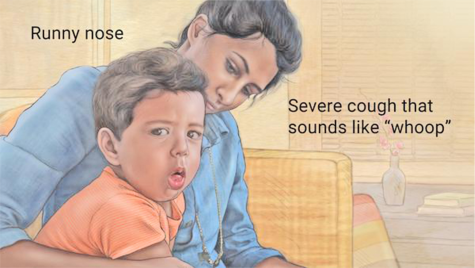Whoop! There it is!
January 31, 2020
 In December 2019, a surprising outbreak of a rare disease swept through the Oak Park and River Forest community.
In December 2019, a surprising outbreak of a rare disease swept through the Oak Park and River Forest community.
The first case was reported Nov. 20, and more cases cropped up throughout November and December. By the end of December, at least five students and one adult at OPRFHS alone had contracted the disease. Although the disease is highly contagious and airborne, the small outbreak was nonetheless unexpected, as the sickness — pertussis, also known as whooping cough — has been nearly eradicated in the United States and other highly developed countries.
“Pertussis is (another name for) whooping cough. It’s a contagious disease that causes a very bad cough,” said OPRF head nurse Julee Terretta. “The cough can become so severe that it can lead to vomiting. It’s hard to detect initially because the early symptoms are flu-like with a cough, and because it is a disease for which we have a vaccine, it is considered a reportable disease with the health department.
A reportable disease is one considered to be of great public health importance due to its nature: rarity, contagiousness, severity, or a combination of all three. Pertussis is reportable partly because a vaccination for it has been available since the 1940s, meaning the disease should be easily preventable in theory. According to the CDC, pertussis incidence had dropped to nearly 1,000 cases per year in the United States by 1976. However, that number rose to as much as 48,277 in 2012. HealthDay News notes this resurgence is largely due to imperfect vaccine coverage.
As the outbreak began, rumors spread amongst students and community members alike. “I think that something like that is common. When people don’t know about something, they’re going to gossip.” Terretta said. “The good news is that there are healthcare professionals in the building who can help eliminate rumors and ease people’s minds if there’s questions.”
The primary concern from parents was whether their child was in danger of contracting pertussis. “More than anything, parents are just concerned what the school community is doing,” Terretta continued. “Parents are also concerned which of their students had direct contact with the infected students, so that was the initial concern.”
The school’s buildings and grounds department immediately took an active role in containing the outbreak. “The school did a lot of extra cleaning of surfaces, especially in rooms where diagnosed students had classes,” Terretta said. “The thing with pertussis is that it’s an airborne disease, and only lives on surfaces for a couple of days, as opposed to cold and flu. The extra cleaning was definitely the best thing that the school could do to help prevent the spread.”
Pertussis, although painful and unpleasant, is only seriously dangerous to infants and the immunocompromised (individuals with weakened immune systems). However, there are still measures students and adults can take to prevent its spread. “I think the biggest thing that would help prevent is just having really good hygiene,” Terretta said. “Making sure during cold and flu season or when there’s an outbreak, that you’re not sharing phones and drinking out of each other’s cups. As always, if there’s any concerns about a reported case, people can call us or come to us with questions.” And, of course, vaccination is key to preventing the disease’s occurrence in the first place.
In the end, although the outbreak caused a brief scare, Terretta emphasized the resources Oak Park and River Forest have access to when it comes to public health. “Oak Park is very lucky to have its own health department, so we can get immediate response, direction, and assistance when we need it,” she said. “That’s something most communities don’t have.”
